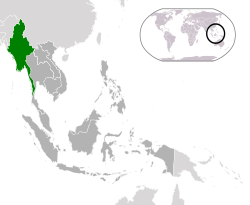
Back República Socialista de la Unión de Birmania (1962-1988) Spanish Burman liiton sosialistinen tasavalta Finnish Repubblica Socialista dell'Unione della Birmania Italian ビルマ連邦社会主義共和国 Japanese မြန်မာ့ဆိုရှယ်လစ်လမ်းစဉ်ပါတီခေတ် Burmese República Socialista da União da Birmânia Portuguese Социалистическая Республика Союз Бирма Russian สาธารณรัฐสังคมนิยมแห่งสหภาพพม่า Thai Burma Birliği Sosyalist Cumhuriyeti Turkish Liên bang Cộng hòa Xã hội chủ nghĩa Miến Điện Vietnamese
Union of Burma (1962–1974) ပြည်ထောင်စု မြန်မာနိုင်ငံတော် Pyidaunzu Myăma Nainngandaw Socialist Republic of the Union of Burma (1974–1988) ပြည်ထောင်စု ဆိုရှယ်လစ်သမ္မတ မြန်မာနိုင်ငံတော် Pyidaunzu Soshallhaitsammat Myăma Nainngandaw | |||||||||
|---|---|---|---|---|---|---|---|---|---|
| 1962–1988 | |||||||||
| Anthem: ကမ္ဘာမကျေ Kaba Ma Kyei "Till the End of the World" | |||||||||
 | |||||||||
| Capital | Rangoon | ||||||||
| Common languages | Burmese | ||||||||
| Religion | Buddhism (majority) | ||||||||
| Demonym(s) | Burmese | ||||||||
| Government | Unitary one-party socialist republic under a totalitarian military dictatorship | ||||||||
| President | |||||||||
• 1962–1981 (first) | Ne Win[a] | ||||||||
• 1988 (last) | Maung Maung | ||||||||
| Prime minister | |||||||||
• 1962–1974 (first) | Ne Win | ||||||||
• 1988 (last) | Tun Tin | ||||||||
| Legislature | Union Revolutionary Council (1962–1974) People's Assembly (1974–1988) | ||||||||
| Historical era | Cold War | ||||||||
| 2 March 1962 | |||||||||
| 3 January 1974 | |||||||||
| 18 September 1988 | |||||||||
| HDI (1980) | 0.328[1] low | ||||||||
| Currency | Kyat | ||||||||
| Driving side | left (until 1970) right (after 1970)[2] | ||||||||
| Calling code | 95 | ||||||||
| ISO 3166 code | MM | ||||||||
| |||||||||
| Today part of | Myanmar | ||||||||
| History of Myanmar |
|---|
 |
|
|
|
|
|
|
Burma (Myanmar) was under the military dictatorship of Ne Win from 1962 to 1988. Ne Win and his allies in the Tatmadaw (Burmese military) overthrew the government of Prime Minister U Nu in a coup d'état on 2 March 1962. A day later, the coupists established the Revolutionary Council of the Union of Burma as the country's governing body. In April 1962, the Revolutionary Council introduced the Burmese Way to Socialism and declared it Burma's state ideology. The Revolutionary Council then founded the Burma Socialist Programme Party (BSPP) as the country's vanguard party on 4 July 1962. In 1974, Ne Win introduced a new constitution and replaced the Revolutionary Council with the People's Assembly, which consisted solely of BSPP members. The country's official name was also changed from the Union of Burma[b] to the Socialist Republic of the Union of Burma.[c]
Ne Win's governance of Burma was characterised by totalitarianism, isolationism, superstition, xenophobia, and a rejection of Cold War politics. Ne Win ruled Burma as a dictator, serving as both Chairman of the Revolutionary Council (later President of Burma) and Prime Minister of Burma, the country's head of state and the head of government, respectively. The nationalisation of major industries and rejection of foreign investment led to catastrophic declines in economic growth and living standards.
In 1988, mass protests known as the 8888 Uprising pressured BSPP officials, including Ne Win, to resign en masse and adopt a multi-party system. However, on 18 September 1988 the Tatmadaw staged a coup against the BSPP, violently ended the protests, and established a new military junta, the State Law and Order Restoration Council (SLORC).
Cite error: There are <ref group=lower-alpha> tags or {{efn}} templates on this page, but the references will not show without a {{reflist|group=lower-alpha}} template or {{notelist}} template (see the help page).
- ^ "Human Development Report 2014" (PDF). hdr.undp.org. Archived (PDF) from the original on 18 October 2015. Retrieved 6 January 2022.
- ^ Po, Myo Min (6 December 2019). "The Day Myanmar Started Driving on the Right". The Irrawaddy. Archived from the original on 17 February 2023. Retrieved 8 March 2023.

